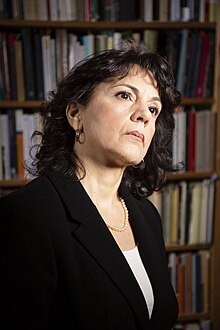Donatella Di Cesare
Donatella Di Cesare (* 1956 in Rome ) is an Italian philosopher and essayist. She teaches and researches as a professor of theoretical philosophy at the Sapienza University in Rome.
Life
Donatella Di Cesare studied Philosophy , Classical Philology and Linguistics at La Sapienza University in Rome. She then spent several years at German universities, first at the University of Tübingen, then in Heidelberg, where she was the last student of Hans-Georg Gadamer . Her preoccupation with phenomenology and philosophical hermeneutics was influenced by Jacques Derrida's deconstruction. These considerations were reflected in later published essays and two books: Gadamer. A Philosophical Portrait (2009) and Utopia of Understanding. Between Babel and Auschwitz (2012).
After the publication of Martin Heidegger's Black Hefts , Di Cesare dealt with the responsibility of philosophy for the annihilation of the Jews in the book Heidegger, the Jews, the Shoah (2016).
Torture (2018) documents the question of violence and people as victims of extreme violence . The political and ethical problems in the age of globalization and the resulting phenomena of terror as the dark side of global civil war were examined in the volume Terror and Modernity (2019).
The momentous conflict between the state and migrants is the central theme of the book Resident Foreigners: A Philosophy of Migration (2020).
A summary of Donatella Di Cesare's philosophical positions can be found in the book Sulla vocazione politica della filosofia (2018), which was awarded the Mimesis Filosofia Prize in 2019 and will also be published in German in 2020 ( On the political vocation of philosophy ).
In spring 2020, the corona pandemic will hit Italy with full force. In the essay Sovereign Virus? The shortness of breath of capitalism (2020) Donatella Di Cesare processes the worldwide experience of crisis as a problem of a completely globalized and capitalized world and puts the political vocation of philosophy to the test of this collective exceptional situation.
Di Cesare is a member of the Scientific Advisory Board of the International Ludwig Wittgenstein Society and the Wittgenstein Studies. From 2011 to 2015 she was Vice President of the Martin Heidegger Society , from which she resigned on March 3, 2015 after the publication of the Black Booklet .
She was visiting professor at numerous universities: u. a. Hildesheim 2003; Albert Ludwig University in Freiburg 2005; Cultural Studies Research College in Cologne 2007. In the 2007 winter semester she was Distinguished Visiting Professor of Arts and Humanities at the Pennsylvania State University (USA). In 2012 she was visiting professor in the Department of Languages and Literatures at Brandeis University (USA). In 2017, she was teaching at the Scuola Normale Superiore di Pisa (Italy) for one year.
Publications (selection)
- The language in the philosophy of Karl Jaspers. Francke, Tübingen et al. 1996, ISBN 3-7720-2164-6 .
- Wilhelm von Humboldt. (1767-1835). In: Tilman Borsche (ed.): Classics of the philosophy of language. From Plato to Noam Chomsky. Beck, Munich 1996, ISBN 3-406-40520-7 , pp. 275-289.
- as editor and introduction. In: Wilhelm von Humboldt : About the differences in the structure of human language and their influence on the spiritual development of the human race (= UTB . 2019). Ferdinand Schöningh, Paderborn et al. 1998, ISBN 3-506-99501-4 .
- The concealment of the voice. Gadamer between Plato and Derrida. In: International Yearbook for Hermeneutics . Volume 5, 2006, pp. 325-345.
- Átopos. Hermeneutics and the out-of-place of understanding. In: Andrzej Przylebski (Ed.): Das Erbe Gadamer (= Dia-Logos. 8). Peter Lang, Frankfurt am Main et al. 2006, ISBN 3-631-55195-9 , pp. 85-95.
- Understand Auschwitz. A philosophical consideration. In: Information Philosophy . Vol. 35, No. 4, 2007, pp. 22-29, (online)
- Gadamer. A philosophical portrait. Mohr Siebeck, Tübingen 2009, ISBN 978-3-16-149946-3 .
- Heidegger, being and the Jews. In: Information Philosophy. Vol. 42, No. 4, 2014, pp. 8–21, (online)
- Heidegger, the Jews, the Shoah (= HeideggerForum. 12). German, extended edition. Vittorio Klostermann, Frankfurt am Main 2016, ISBN 978-3-465-04253-2 .
- On the political calling of philosophy . Trans. V. Daniel Creutz. Matthes & Seitz, Berlin 2020, ISBN 978-3-95757-871-6 .
- Sovereign Virus? The shortness of breath of capitalism . Trans. V. Daniel Creutz. Konstanz University Press, Konstanz 2020, ISBN 978-3-8353-9132-1 .
Web links
- Literature by and about Donatella Di Cesare in the catalog of the German National Library
- Website Donatella Di Cesare ( Memento of June 2, 2003 in the Internet Archive )
- Donatella Di Cesare on Academia.edu
Individual evidence
- ↑ Donatella Dicesare | Facoltà di Lettere e Filosofia. Retrieved June 18, 2020 (Italian).
- ↑ Di Cesare, Donatella: Heidegger, the Jews, the Shoah. Retrieved June 18, 2020 .
- ^ Torture, by Donatella Di Cesare. September 20, 2018, accessed June 18, 2020 .
- ↑ Terror and Modernity . ( politybooks.com [accessed June 18, 2020]).
- ^ Review: Give Me Your Migrants. Retrieved June 18, 2020 .
- ↑ LUCIANO CANFORA: Donatella Di Cesare, il nuovo libro. La sfida di una filosofia militante. October 21, 2018, accessed June 18, 2020 (Italian).
- ^ "Virus sovrano?": Donatella Di Cesare e l'asfissia capitalistica ai tempi della pandemia. May 8, 2020, accessed June 18, 2020 (Italian).
- ↑ webdecker- www.webdecker.de: Donatella Di Cesare. Retrieved June 18, 2020 .
- ↑ Donatella Di Cesare: Sovereign Virus - Konstanz University Press. Retrieved June 18, 2020 .
- ^ Board of the Martin-Heidegger-Gesellschaft.
- ^ Badische Zeitung: The second resignation - Culture - Badische Zeitung. Retrieved June 18, 2020 .
- ↑ Donatella Dicesare | Facoltà di Lettere e Filosofia. Retrieved June 18, 2020 (Italian).
| personal data | |
|---|---|
| SURNAME | Di Cesare, Donatella |
| BRIEF DESCRIPTION | Italian philosopher |
| DATE OF BIRTH | 1956 |
| PLACE OF BIRTH | Rome |
